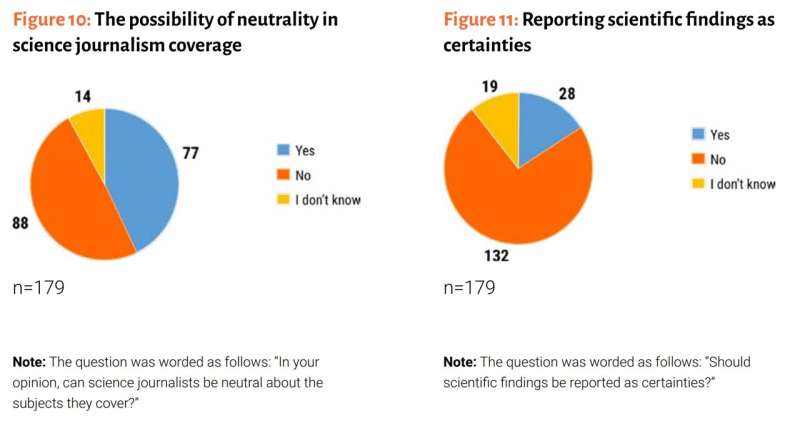This article has been reviewed according to Science X's editorial process and policies. Editors have highlighted the following attributes while ensuring the content's credibility:
fact-checked
proofread
Establishing the boundaries of ethics in science journalism in Latin America

The results of a survey mapping the views of science journalists on science journalism in Latin America and the Caribbean were released during the 12th World Conference of Science Journalists in Medellín, Colombia.
The report, "Science Journalism In Latin America and the Caribbean 2022," probes ethical topics, such as the legitimacy of establishing the ethical priorities of science journalism, knowledge of professional associations and codes of ethics, and ethical protections and violations. The survey was conducted by the World Federation of Science Journalists (WFSJ) in partnership with the National Institute of Public Communication of Science and Technology in Brazil, with the support of The Kavli Foundation.
The survey was carried out using a questionnaire containing 32 questions over two weeks in February 2022, and obtained 179 responses from professionals across Latin America and the Caribbean in 18 countries in the region. The survey was distributed in Spanish, Portuguese and English. Key findings include:
- Most respondents say that there is a science journalism association in their country (73%), but only about half of them are unaware of the existence of a code of ethics (55%)
- About one-third of respondents consider the main roles of a science journalist are to inform (32%) and to explain science (32%), with others that feel their role is to promote science (16%) or be a public watchdog (9%)
- Three-quarters (75%) use the most prominent scientists in the field as sources and just over half (52%) seek to have gender balance
- The majority think that scientific findings should not be reported as certainties (74%)
- Most respondents agree that fraud (80%), retractions (72%) and errors (75%) should always be reported
- Latin American science journalists are evenly divided on whether they can be neutral on the subjects they cover, with the proportion of those who do not believe in this neutrality being slightly higher (49%) than the proportion of those who believe in it
These responses prompted the WFSJ to probe further with an extended global survey, asking the same set of questions to science journalists globally. The results of this survey will be released in the coming months. The Federation is also working to develop a set of Guiding Principles of Science Journalism for the global science journalism community.
Journalist respondents were primarily full- or part-time staff (44%) and freelance full- or part-time (40%). The majority of overall respondents were from Mexico, Brazil, and Chile (55%), followed by Argentina and Colombia (20%), and the remaining quarter (25%) other distributed among the countries in the region. Women were the predominant respondents at 60% and 40% for men. Respondent age groups were evenly distributed between 25 to 54, with 35 to 44 years at 33%, 45 to 54 years at 27% and 25 to 34 years at 23%. Those over 54 made up 16% and 18 to 24 at 2%. Most respondents have a university degree in journalism/communication (75%) and some others in science (13%).
Luisa Massarani, a co-author of the report and a science communicator and researcher at the National Brazilian Institute of Public Communication of Science and Technology and the Oswaldo Cruz Foundation (Fiocruz), in Rio de Janeiro said, "This is the first survey that I am aware of in Latin America that addresses the issue of the ethics in science journalism. Thanks to the high engagement of the science journalism associations, we have a clear snapshot of the ethical priorities, protections, and violations of science journalism in the region as well as insights into attitudes toward coverage neutrality, scientific controversies, uncertainties, fraud, errors, and retractions."
More information: Report: wfsj.org/wp-content/uploads/20 … ation-LAC-survey.pdf
Provided by World Federation of Science Journalists




















